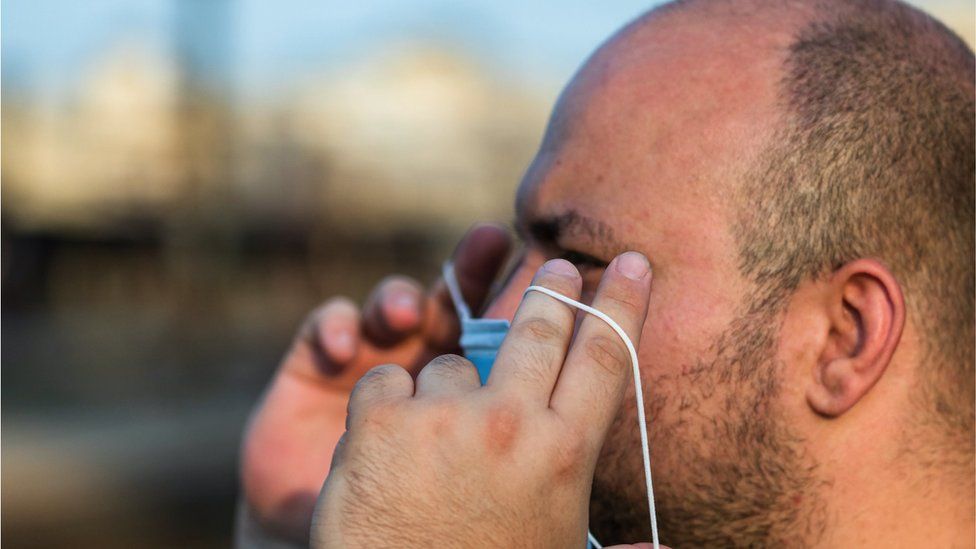Thin Edge of the Wedge
"[The study showed a small increased risk after vaccination.]""However, these adverse events were dwarfed by the neurological disorders seen after testing positive for Covid.""Guillain-Barre syndrome, myasthenia-like disease, subarachnoid haemorrhage, encephalitis, and Bell's palsy were all quite common, especially in the first two weeks after testing positive for Sars-Cov-2."Professor Peter Openshaw, Imperial College London"There are risks clearly associated with the vaccine but there are more substantial risks associated with infection."Aziz Sheikh, professor, primary care research and development, University of Edinburgh"The really big message from this is these are very rare neurological events that might be associated with the vaccine.""But there is overwhelming evidence of the effectiveness of the vaccine against serious illness.""I also work as a GP and we want to make sure people are taking up the vaccine and booster jabs, and by doing that we will protect the health of the nation in the best way we can."Professor Julia Hippisley-Cox, University of Oxford, United Kingdom
 |
| Rare neurological conditions
may occur after Covid vaccination, but the risk is far higher in people
who catch Covid, new research suggests. Getty Images |
While Britain used its own home-grown anti- COVID vaccine developed by researchers at Oxford University, the vaccine drew controversy and suspicion right from the word 'go' a year previously when
Europe in particular began to question its safety and efficacy, withdrawing its use altogether finally. A casual onlooker might be forgiven for thinking briefly that this was a bit of pay-back for Britain having the gall to leave the EU through Brexit. But there were legitimate issues seen with the vaccine, as for example its impact on the heart, and blood clots, albeit in rare instances particularly seen in some age groups.
Now Oxford University has completed a research project finding that Guillain-Barre syndrome episodes have been linked to the AstraZeneca vaccine. They found as well that Guillain-Barre can result as a complication from COVID-19; again in small numbers, but greater than what occurs as a result of inoculation with the vaccine. Guillain-Barre is a condition affecting the nerves, manifesting commonly as numbness and pain in hands and feet.
With no connection to the Oxford scientists who had created the vaccine, a group of academics from Oxford conducted some research, finding that for every ten million doses administered in Britain 38 cases of Guillain-Barre syndrome surfaced -- in comparison with a non-COVID, non-vaccine baseline. On the other hand, 145 excess cases per ten million people were seen to have occurred, after testing positive for COVID.
Data was extracted from over 30 million people in Britain, used to assess how people's chances of developing adverse neurological complications were, due to the vaccine, or/and the virus. An individual inoculated with AstraZeneca was found to be close to three times likelier to develop Guillain-Barre syndrome two to three weeks following inoculation -- in comparison with never receiving a vaccine dose.
If an individual was infected with COVID, the risk was found to be significantly higher, some five times as likely to develop the condition, within a month of testing positive. According to the research results, 15 to 21 days following the AstraZeneca dose, individuals can be 29 percent more at risk of Bell's palsy than normal. In contrast, within a month of testing positive for COVID, an individual becomes 34 percent more likely to develop Bell's palsy.
The study showed that following the first dose of vaccine, there were:
- 38 extra cases (compared to the baseline risk of getting the condition) of GBS for every 10 million adults having the Oxford-Astrazeneca vaccine
- 60 extra cases of haemorrhagic stroke (a bleed in the brain) for every 10 million adults having the Pfizer vaccine
For people who had a coronavirus infection on the other hand, there were approximately:
- 145 extra GBS cases per 10 million with a positive test
- 123 extra brain inflammation disorder cases like encephalitis meningitis and myelitis per 10 million people
- 163 extra cases of myasthenia-like disorders (immune conditions affecting the nerves and muscles) per 10 million people
 |
| A health worker prepares a dose of the AstraZeneca vaccine to be administered to a patient. (AP Photo/Alessandra Tarantino) |
Labels: AstraZeneca, Complications, Oxford University, Research, SARS-CoV-2 Complications

0 Comments:
Post a Comment
<< Home